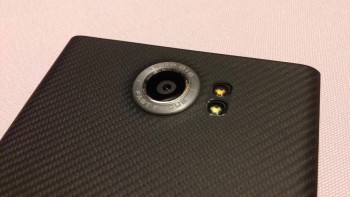
Blackberry Venice with Android appears in real photos, 16MP camera and microSD confirmed
Needed more proof that the Blackberry Venice Android phone was real? The early leaks were convincing enough, but the device — which might be AT&T exclusive when it launches — has been leaked in a new series of photos, giving us a clear look at real hardware in the flesh. It’s running Android, which would be a first for any Blackberry device.
The shots do well to show off the Venice’s hardware keyboard, which slides from beneath the phone in portrait mode. It’s a little weird to get used to seeing, but if we know anything about Blackberry we know they’ll probably make sure it doesn’t feel weird in actual use.
QWERTY keyboards have become a thing of the past, so it’s refreshing to see a quality hardware vendor attempt to bring them back in what should turn out to be a high-end device.
Unfortunately, we still don’t know much more about the Venice, although the shots do confirm that the camera is 16 megapixels with fast autofocus. That camera has dual-flash sitting next to it. We can also see that one prototype makes room for a microSD card slot alongside the SIM card slot.
There’s also a weird key slotted between the volume buttons. It’s possible this could be a programmable key that launches an app when pressed, or one that brings up Blackberry’s assistance software. Or perhaps it’s just the most oddly placed power button ever. One last detail: front-facing speaker. Awesome.
It’s a very big deal for Blackberry to be making an Android device. It’s not as if the company had ever waged war on Android like Steve Jobs’ Apple, but whenever a major software + hardware vendor gets on board with the world’s leading mobile OS it’s reason to take notice.
Blackberry’s work on bringing improved device security to Android will help make the platform more acceptable for enterprise, which is something that’s becoming increasingly more important as new dangerous vulnerabilities are uncovered. The Blackberry Venice is the perfect device to showcase how it can help shield companies against all that nasty stuff and make it worry-free to use an Android phone for work. We certainly can’t wait until all of this is official and we hope the Waterloo company won’t take long to make that happen!